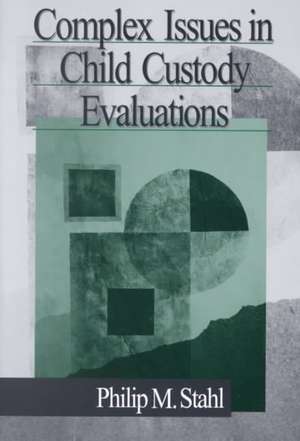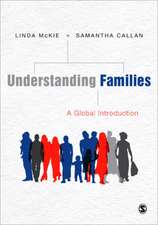Complex Issues in Child Custody Evaluations
Autor Philip M. Stahlen Limba Engleză Paperback – 29 mai 1999
Preț: 789.64 lei
Preț vechi: 867.74 lei
-9% Nou
Puncte Express: 1184
Preț estimativ în valută:
151.11€ • 164.09$ • 126.94£
151.11€ • 164.09$ • 126.94£
Carte tipărită la comandă
Livrare economică 23 aprilie-07 mai
Preluare comenzi: 021 569.72.76
Specificații
ISBN-13: 9780761919094
ISBN-10: 0761919090
Pagini: 232
Dimensiuni: 152 x 229 x 12 mm
Greutate: 0.32 kg
Ediția:New.
Editura: SAGE Publications
Colecția Sage Publications, Inc
Locul publicării:Thousand Oaks, United States
ISBN-10: 0761919090
Pagini: 232
Dimensiuni: 152 x 229 x 12 mm
Greutate: 0.32 kg
Ediția:New.
Editura: SAGE Publications
Colecția Sage Publications, Inc
Locul publicării:Thousand Oaks, United States
Cuprins
Introduction
PART ONE
Alienation and Alignment of Children
Domestic Violence
Allegations of Sexual Abuse Evaluations
Move-Away Evaluations
PART TWO
Issues with High-Conflict Families
Child Considerations in Custody Recommendations
The Components of the Evaluator's Recommendations
PART THREE
Use of Psychological Testing in Custody Evaluations
Cultural Issues in Evaluations
Tackling the Terror of Testifying
Ethical Issues
PART ONE
Alienation and Alignment of Children
Domestic Violence
Allegations of Sexual Abuse Evaluations
Move-Away Evaluations
PART TWO
Issues with High-Conflict Families
Child Considerations in Custody Recommendations
The Components of the Evaluator's Recommendations
PART THREE
Use of Psychological Testing in Custody Evaluations
Cultural Issues in Evaluations
Tackling the Terror of Testifying
Ethical Issues
Notă biografică
Descriere
Over the past five to 10 years, there has been a significant increase in the use of child custody evaluations by the courts. At the same time, the issues have become more complex and difficult. In this book, the author provides a theoretical and practical understanding of many of the issues. A key component is the integration of disparate research findings into a comprehensive resource that will enable the evaluator and the court to understand these complex issues. A second component is to provide a thorough understanding of the fact that divorce brings with it a set of complex needs, and evaluators and the courts must develop a paradigm for weighing these needs in a comprehensive manner.












